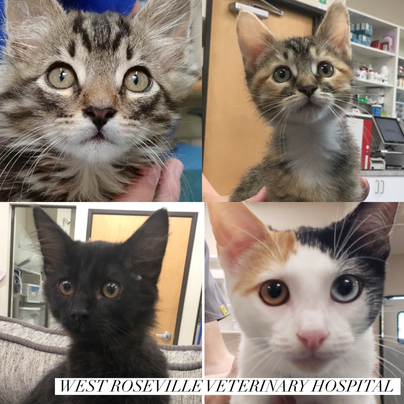New Kitten Care

We want to provide you with some simple and very helpful tips for your first few months with your new kitten.
- Toys and games are a big deal with a new kitten. Chasing toys is a natural predatory behavior in cats and they will chase what you teach them when they are young. It may be cute to have the kitten attack your hands and feet when they are 2 pounds, but it is not fun for anyone at 2 in the morning when they weigh 10 pounds. Teach them to chase cat toys, some great examples are feathers hanging on a string, wind up mice, rolling balls. If the kitten goes after hands and feet, WALK AWAY, teach them game time is over when they do that.
- Scratching posts should be available to your kitten and cats. Both vertical and horizontal should be provided because they assist stretching. Rope wrapped types are best because cats are texture sensitive and they will scratch what they learn to as a kitten. If you use the card board type then they will h
ave a tendency to shred boxes in the house. Plain carpet is not a good idea because that trains them to tear up all carpet. - We recommend an effective flea product (and possibly tick depending on where you live and where you will go) given regularly year round. Strictly indoor animals do get fleas. Don’t take the winter off! The fleas can take advantage of you. There are a lot of products around today that the fleas are immune too. We will recommend the most effective products available during your exam
- Desensitizing. This is very important in the young kitten to get them used to having sensitive areas handled, such as ears, mouth, and toes. When your kitten is very relaxed (not during play time) gently pick up the toes and give them a soft squeeze, only the point that your kitten notices but does not resist. Play with the ears, lift up the lips and check the teeth. The goal here is NOT to hold the kitten tight and force him/her to do this, be gentle and slow and teach that it is not frightening. This will make for stress free nail trims and ear cleaning down the road!
- Brushing teeth and other dental care is best started young, it’s ideal to do daily, but at the minimum 3 times a week. Generally kittens are easier to train than puppies when started young.
- Meal feeding is best. Obesity is a big problem in cats and it helps to manage if they are not used to having a bowl of food out all the time.
- You should have already discussed your kitten’s personalized vaccine schedule with the doctor.
Getting a new kitten is an exciting event. Our first recommendation is to schedule an exam with one of our experienced veterinarians to get a personalized vaccine schedule and go over any questions you might have. Some things to consider is the pets lifestyle, what kind of food is best, and what sort of preventive care and medications does my kitten need, and much more!